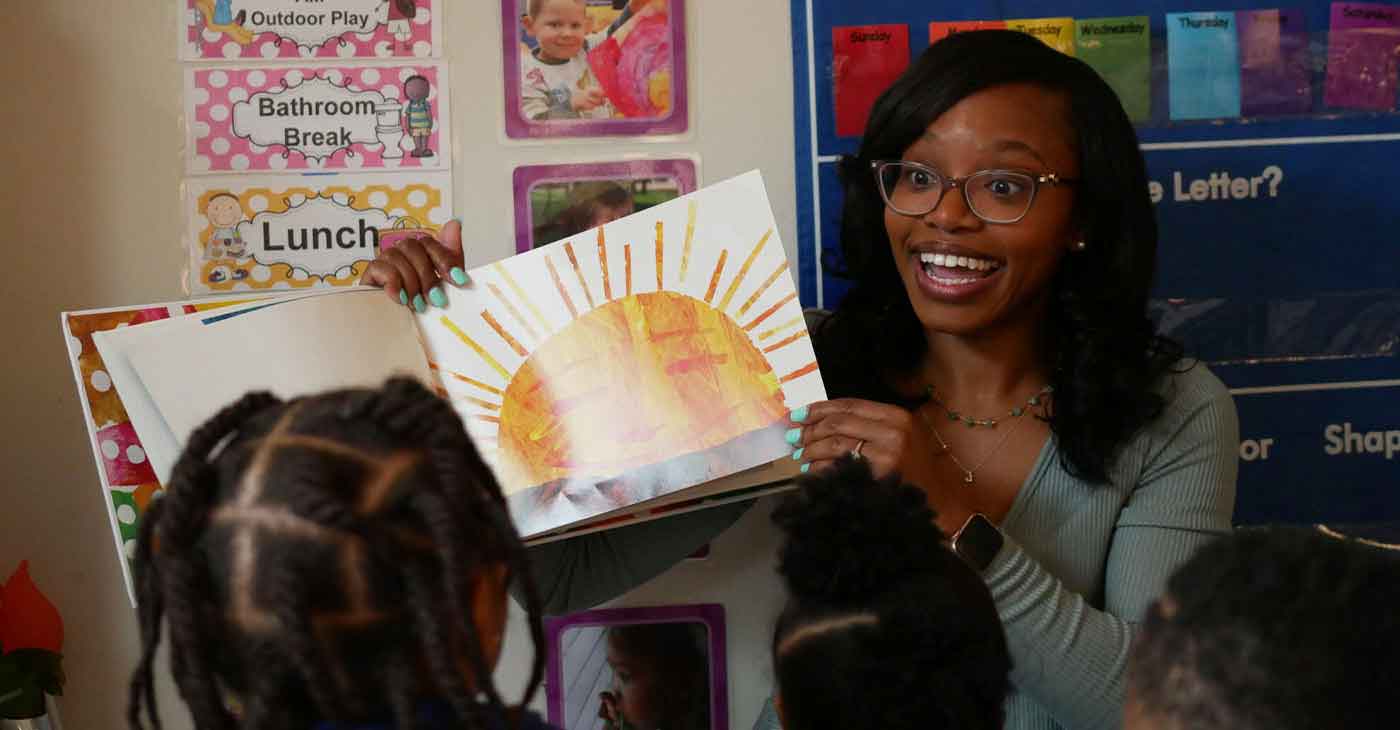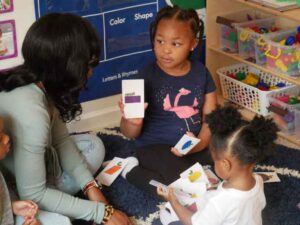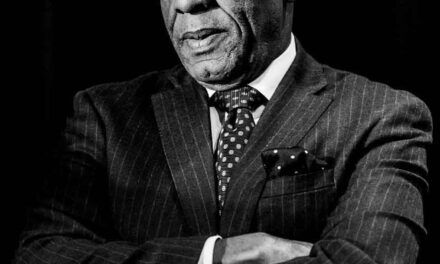Family Childcare Homes Face Enormous Hurdles
Shalicia Jackson, also known as Shay, has done almost everything there is to do in early childhood education. Jackson has been an assistant childcare teacher, a lead teacher, a Head Start coordinator, a family advocate, and a social worker in public schools. She has worked in nonprofits and at the Durham Partnership for Children in North Carolina, training teachers to better support young children.

By Liz Bell, EdNC
Shalicia Jackson, also known as Shay, has done almost everything there is to do in early childhood education. Jackson has been an assistant childcare teacher, a lead teacher, a Head Start coordinator, a family advocate, and a social worker in public schools. She has worked in nonprofits and at the Durham Partnership for Children in North Carolina, training teachers to better support young children. She holds a bachelor’s degree in early childhood education and a master’s degree in social work. But when Jackson opened Modern Early Learning Academy in 2022, a five-star family childcare home in Winston-Salem, she entered a new world. “One of the things I didn’t really have experience in was family childcare,” Jackson said on a sunny day in her backyard. “I knew they were out there, but they were — like we are now — invisible. We’re an invisible workforce.” Inside an industry on the brink of collapse, family childcare providers often feel even more devalued than their center-based counterparts. Family childcare homes, and licensed programs in providers’ residences, receive lower subsidy reimbursements than centers and lack opportunities to get North Carolina Pre-K funding. The statewide number of family childcare homes has dropped by 34% since 2018. Yet parents and children often prefer family childcare for its intimate environments, flexible scheduling, and cultural and linguistic relevance. Its business model is also more sustainable than models for center-based care in rural areas, experts say, since often there are not enough children of a certain age in a community to make up entire classrooms. In the years since the pandemic, regional and state efforts have formed to protect the state’s family childcare network, recruit new home-based providers, and provide training and advocacy opportunities.

Students play a matching game at Modern Early Learning Academy. Photo by: Liz Bell, EdNC
Jackson’s program is the product of one of those efforts — a 2021 family childcare expansion project from Smart Start of Forsyth County of North Carolina focused on women of color interested in opening a program. Yet hers is the only surviving program of the five that received the project’s start-up grants. “This has been the most challenging yet rewarding career choice to date,” Jackson said. “That’s why I advocate — for the people that came before me and those that will come after me. I have to do my due diligence, because, coming from wearing many different hats in this field, this right here, it’s very hard work.” With even more uncertainty facing childcare in the coming years, Jackson has made it her mission to bring more understanding, respect, and investment to family childcare, starting with her fellow local providers.
Balancing many roles
It was Jackson’s experience as a parent that led her down this unexpected path. After moving from Durham to Winston-Salem for more affordable housing, Jackson planned to commute back to her job in Durham. But, like so many new parents returning to work, she couldn’t find childcare for her toddler son. “I was devastated. Everywhere I called,” she said, the waitlist “was like six months to a year to beyond.” Her sister brought up the idea of opening a family childcare home. It could solve her childcare issue while letting her spend more time with her son. Plus, she had space and early childhood experience. Over the past three years, Jackson has discovered the job’s intensity and multidimensional demands. Family childcare providers are balancing several roles. They are the sole provider not only of care and education, but of food, transportation, and family support services. They are also administrators, making their own curriculum and assessment choices, and keeping up with licensing and reporting responsibilities. And they are business owners, managing the finances of their programs and collecting payments from families. “That is the challenge — wearing all those different hats and having to manage all of that,” Jackson said. “Instead of comparing family childcare providers to teachers, we need to be compared to directors.”
The very thing that got Jackson into family childcare — motherhood — has turned into one of the trickiest balancing acts, she said. Because of the state’s licensing rules, her son KJ occupies one of her facility’s licensed seats. But for three hours during the day, he instead attends another childcare program that recently opened. It was too challenging to create clear boundaries, for herself and her son, she said. “I found it really hard to balance being his mommy and being his teacher, and also he was having a really difficult time trying to manage being home and at school, telling the difference,” she said. That means Jackson is losing out doubly, she said because she is paying for out-of-home childcare but can’t enroll another child in her son’s place. Plus, as KJ enters kindergarten next year, Jackson is struggling with how to move forward. “My reason for opening is now going away,” Jackson said. “My wheels are turning.”
‘A seat at the table’
Though Jackson stumbled into family childcare for personal reasons, she has found a larger purpose in connecting with family childcare providers who have been in the field for decades. Understanding just how taxing the job is, Jackson wanted a space for others in her role to find support and understanding. She formed the Triad Self Care Support Group as that space, an in-person and online support group that provides fellowship, professional development, and a space to share stories, resources, and challenges.
More on childcare
Jackson also shares advocacy tools and opportunities. She had just assembled members of the group to show up to a local conversation with elected officials and representatives from local institutions. By the end of the day, Jackson had a voicemail from a local Smart Start employee she had met at the event, asking how their efforts could include family childcare providers. “It is time for family childcare home providers to have a seat at the table with the people that are making decisions,” Jackson said. “We can no longer afford to sit back and just vent about it. We need to be solution-focused and start joining committees and organizations, start being a part of the communities that are making decisions — going out and showing face. Because if not, then we’re just going to keep being at the bottom of the bottom. They’re going to prioritize other things, and we’re just going to be left suffering again.” Jackson is serving as a member of the steering committee for the Pre-K Priority, a universal pre-K effort in Forsyth County that is expanding access but does not currently include family childcare homes as potential sites. She is also connected with the state chapter of the National Domestic Workers Alliance to advocate for early childhood investment at the state level. In November, she was awarded an NC Early Education Coalition’s Child Care Heroes award for her advocacy as a family child care provider.
“In my journey of advocacy, I have learned that although I have won various roles within the early childhood field, and have a master’s degree, anyone can be a change agent without needing big titles or degrees, but rather a willingness to raise their voice and advocate for what they believe in,” Jackson said while accepting that award. “Parents and childcare providers play a crucial role in determining what is best for their children. Their guidance and decision-making skills are nothing short of heroic, making them the real heroes. We must recognize their invaluable contributions and amplify their voices.” The children inside her home, and the families she treats as extensions of her own, are the core of the community Jackson has created. “Childcare is my ministry,” Jackson said. “It’s where I was led to. The universe led me here. They keep me going, just to see their improvement, to see the parents happy. That keeps me hopeful.”
‘Not on a good path’
The story of one of the families Jackson has served has stuck with her through her journey of caregiving, educating, and advocating. It’s the story of Cayden and Samantha Black. Cayden attended Jackson’s program after his previous childcare facility closed because of staffing shortages. The program gave the family 30 days to find another arrangement. “They came to me in desperate need,” Jackson said. Fortunately, she had an open spot. Cayden thrived in the program. “I thought it was just heaven there,” said Black, Cayden’s mom. “He was at big daycares, where there’s a lot of children and only one teacher. With Ms. Shay, it was her and only five other kids. So, they all got one-on-one time, and it was more of a home setting. And he liked that.” Both Black and Jackson could tell how much Cayden was growing. “He learned so much there for like the year he was there than he did over the three years he was at the other place,” Black said. After working full-time in retail and at an auto shop, Black went on maternity leave to have her second child. Colt was born with complicated health issues, which made it even harder for Black to find childcare.
At the time, Jackson did not have an opening or the capacity to care for a child with a medical condition. Black said she did everything she could to keep Cayden in Jackson’s program. Her in-laws pitched in to help pay for him to stay. But as she kept facing rejections for a spot for Colt, she could no longer afford to keep Cayden in care without returning to work. “My husband is the only one working,” Black said. “He’s a mechanic. He loves his job, but they do not get paid well.” Black is now struggling to meet her children’s needs as a stay-at-home mother. She not only wants childcare access to work but wants to ensure her children can learn. “I feel bad because he needs friends,” she said of Cayden. “He needs the structure of school.” Black said Cayden was heartbroken to leave Jackson’s program. Jackson felt the same way. “I had developed a relationship, and I’d seen so much progress with Cayden,” she said. “That is when it hit me, I was devastated. I was like, this infrastructure of this childcare system is definitely not on a good path. And there needs to be something done. Her story has always stuck with me. I wish there was something that I could have done more to support the family.”
‘I wish I had an answer’
Jackson is committed to doing her part to fix that broader infrastructure, which she knows is at risk of collapsing further. Jackson opened her program while the state was sending stabilization grants with federal funds from the American Rescue Plan Act. Though the job has been challenging, those funds have made it possible. “There is no way that I would have been able to sustain my business to be open this long without the help and support of the stabilization grant and some of the local grants,” she said. Those funds officially ended, and providers are looking toward state legislators to extend them this session. If not, about one in five childcare programs are expected to close within a year, according to a survey from the NC Child Care Resource & Referral Council. Prices for parents are also likely to increase.
Jackson is afraid to face either of those possibilities. She considers herself lucky to have a spouse who helps her financially and emotionally. She is looking for other ways to make ends meet without the burden falling on her parents. “I definitely don’t want to increase those prices, because it’s not fair to my family,” she said. “I do feel like if I just add, like one or two kids for my second shifts, maybe do Uber Eats or something like that, maybe that will help kind of supplement … I don’t know. I wish I had an answer. I’m gonna try to stay in as long as I possibly can. I’m gonna try to maintain.”
Editor’s note: Since this story was first reported, Jackson has had to close Modern Early Learning Academy.
Liz Bell is the early childhood reporter for EdNC.









